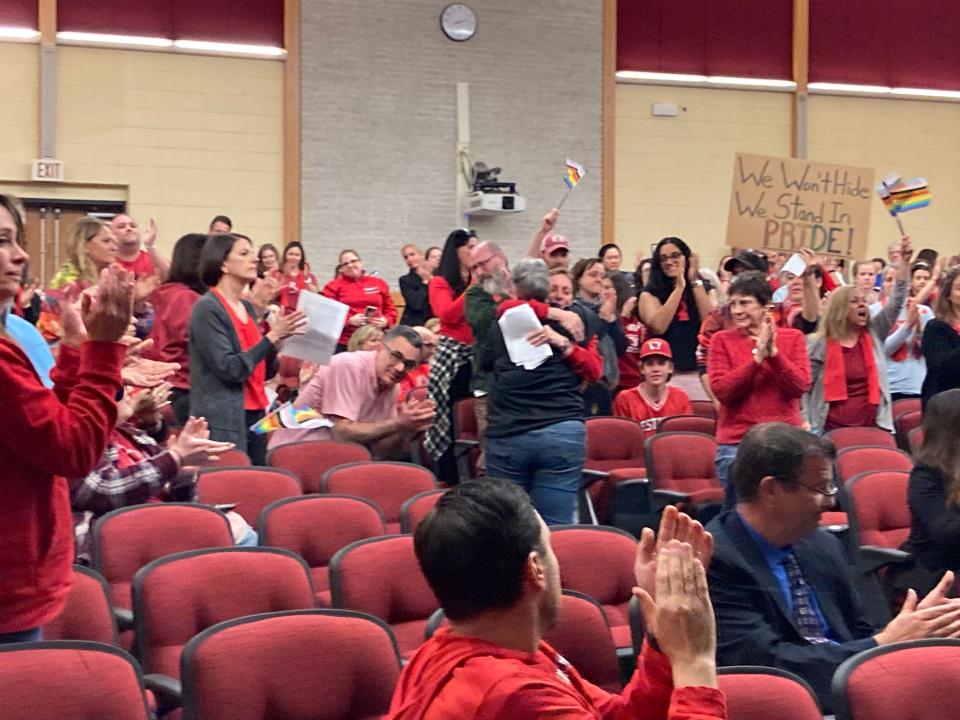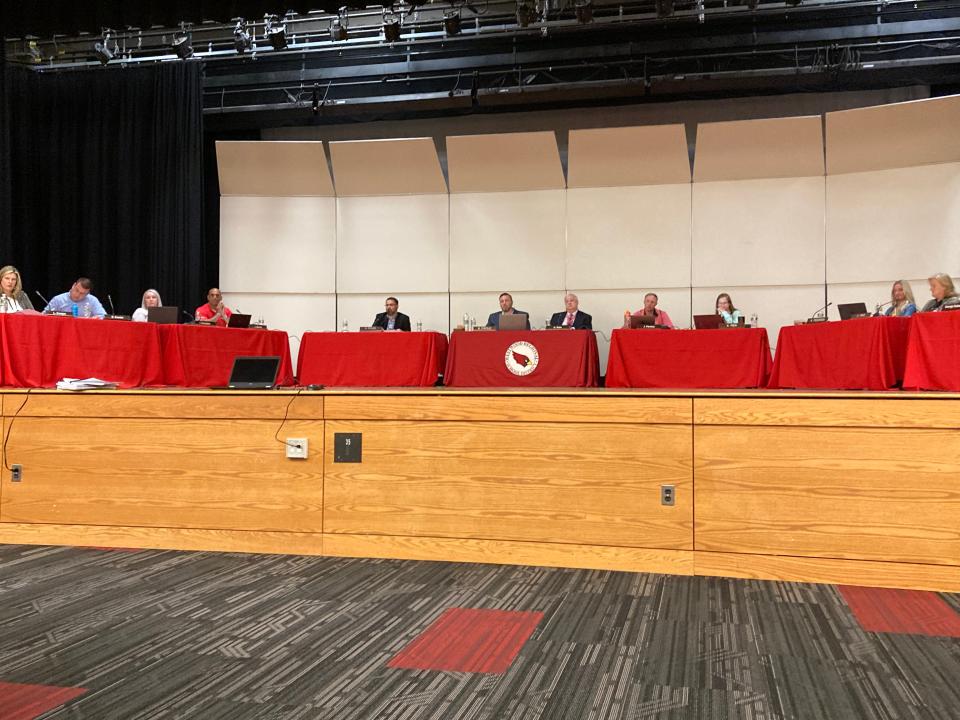Discuss 'controversial issues' in school? Westwood revises rules on classroom debate
Correction: A prior version of this story stated incorrectly that the Westwood school board had added a requirement for superintendent approval before certain "controversial issues" can be discussed in the classroom as well as a requirement that such approvals be reported to the board. In fact, these requirements were already in place in existing policy. This story has been updated to more accurately reflect the changes adopted by the board. NorthJersey.com apologizes for the error.
The Westwood Regional School District board has voted to revise the definition of "controversial issues" that require approval before they can be discussed in classrooms, drawing criticism from those who warned that the change will stifle conversations about real-world topics.
At its July 20 meeting, the board voted 7-2 to adopt changes to its long-standing “controversial issues” policy. Members Jay Garcia and Andrea Peck voted against the revisions. Laura Cooper, James Parrino, Stacey Price, Douglas Cusato, Irene Fenarjian, Kristen Pedersen and board President Michael Pontillo voted for it.
The updated policy preserves a requirement that the superintendent must pre-approve discussions of topics not already included in the district curriculum − and that the superintendent report such decisions to the board.
It also expands the definition of what may be considered controversial, includes stricter language on teachers expressing personal opinions and adds a requirement that parents be notified when such discussions arise.

Critics of the proposal, including some teachers in the K-12 district, said they were concerned it was too vague and that educators may fear discussing sensitive topics that arise organically during discussions with students.
“Teachers don’t read from a script,” Kelly O’Connor, a district teacher, said during a public comment session at the July 20 meeting. “We have unexpected conversations. We engage with students in the context of the real world. This policy is going to discourage teachers of color, teachers from marginalized groups whose own lives and experiences may be deemed controversial.”
No one spoke in support of the policy at the public hearing before the vote, and Board of Education members who voted for it did not hold a discussion about the policy. Pontillo and Superintendent Jill Mortimer did not respond to messages seeking comment this week.
Heated school board meetings have been a regular fixture in the district, where teachers and LGBTQ+ students have complained that a new board majority is trying to police discussion about sex, gender identity and other hot-button topics. The district includes students in Westwood and Washington Township.
Over the past few months, critics turned out to protest after two board members called classroom discussions of same-sex couples a "sensitive topic" and when the board adopted a flag policy allowing only the American and state flags to fly on school grounds. That new policy led to the removal of an LGBTQ pride sign outside the district middle school, though such banners are still allowed inside schools.
What the new policy says
Last week's proposal, which the board agenda said was recommended by the superintendent, altered a memo on the discussion of controversial topics that was first created in March 2007, according to an online copy of the policy. The previous version defined controversial issues as those "on which opposing points of view have been expressed by responsible and thoughtful persons" and those "subject to interpretation as obscene, profane doctrinaire or grossly inappropriate, each in relation to the level of maturity of the pupils concerned."
The new version includes much of that language but builds upon it. It adds that controversial topics are those "that have competing values and interests," touch on "some particular sensitivity (i.e. political or religious)" and may "arouse an emotional reaction of significant academic, social, political and ideological matters...."
More: Westwood schools chief bans media at graduation, warns against hidden cameras in school
The revisions add that controversial topics may also “relate to events in the past, to a current situation or to some future desired outcome.”
What teachers can discuss
The old policy said superintendents must approve any controversial discussions not specified in the "course guide;" the new one says the standard should be the "board-approved curriculum."
When the superintendent approves a discussion outside of that curriculum, "the parents of the student will be notified," the updated memo adds, without further explanation.
Instructions that teachers "should refrain from expressing personal opinions" were changed to a directive that they "will refrain."
Similar to the old policy, the new guidelines say classroom discussions "shall not indoctrinate pupils or persuade them to a particular point of view" and teachers must "ensure fair presentation and open-mindedness and the free exchange of ideas."
Superintendent responds
Garcia, one of the two trustees to vote against the measure, discussed a number of policy changes before the board that night, including the one on controversial topics.
"There is an alarming trend that a majority is voting to expand its power" on daily operations, he said, and to limit information from the public.
"It feels like we are stifling their voice," Garcia said. "Furthermore, we continue to change policies to be for those purposes rather than changing policies that support our educators or enhance education for our students. That would be my focus."
Garcia questioned whether Mortimer felt she "needed the assistance of this board to manage your team of professional educators to safeguard against misconduct and indoctrination."
Mortimer responded that her staff are "good people; they are not groomers, agitators or indoctrinators."
"I can't for the life of me figure out why some in the community are using that as their default position or try to paint the staff members that way," Mortimer added. "It's been very hurtful, very disruptive, and it's doing a lot of damage."

Teachers speak out
Teachers and residents also raised issues with the policy during the public comment section of the meeting.
O’Connor said she was concerned that the new policy “diverges entirely” from local districts and that in the 25 districts she’d looked at, “not one had any of that language.” She also asked who determines what a controversial topic is, since at “least one trustee has stated having two moms or two dads is controversial. This can not be left open to interpretation.”
O'Connor's comments referred to a March 20 meeting at which the board discussed an elementary school health class in which a teacher noted that some families may have two mothers or two fathers. Board members Fenarjian and Pedersen both called that a "sensitive topic." At the same meeting, fellow trustee Cooper noted that parents have the right to opt their children out of such classes and complained of teachers "taking liberties with their manual."
At the July meeting, Amara Geipel, a high school student who identified as a member of the LGBTQ community, also raised the question about what would be considered "controversial." Geipel said she worried that district officials might consider sexuality and gender identity controversial topics, adding that they are "not sensitive subjects, and it would be offensive to imply otherwise."
"My identity isn't sensitive. It's who I am," Geipel said. "It's not controversial and not something to be debated about."
Heather Perin of Washington Township, who is a teacher in another district, said "controversial issues are everywhere in teaching." She said having the superintendent handle all those requests would be "problematic" on top of the other day-to-day issues that may pop up. The policy would be "unnecessary, hard to implement and not a great idea," Perin said.
Perin recalled a time in her Spanish class when she discussed how in Argentina, a woman would not take on her husband's name until they had children and that she had told her students she thought it was "cool."
"Is that controversial?" Perin asked the board. "I don't know. To me, I was just sharing something that I thought about that particular topic and in an attempt to share some information and excitement and Spanish culture with my students."
Sean Spiller, president of the New Jersey Education Association, the state teachers' union, told NorthJersey.com in a statement Wednesday that Westwood's was the "first such policy" the group has seen to adopt such language. He said the move was "clearly aligned with attempts here in New Jersey and nationally, by a small, vocal minority, to impose their will and personal beliefs on all students, parents and educators in our public schools."
"Educators are professionals who are trained to deliver age-appropriate content and should be trusted to do so," Spiller said.
Stephanie Noda is a local reporter for NorthJersey.com. For unlimited access to the most important news from your local community, please subscribe or activate your digital account today.
Email: noda@northjersey.com
Twitter: @snoda11
This article originally appeared on NorthJersey.com: Westwood NJ school policy revises rules for 'controversial issues'

